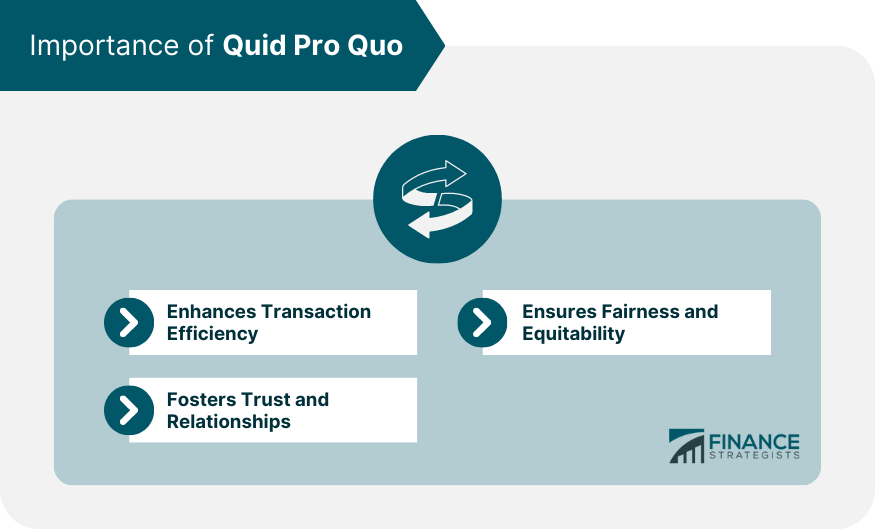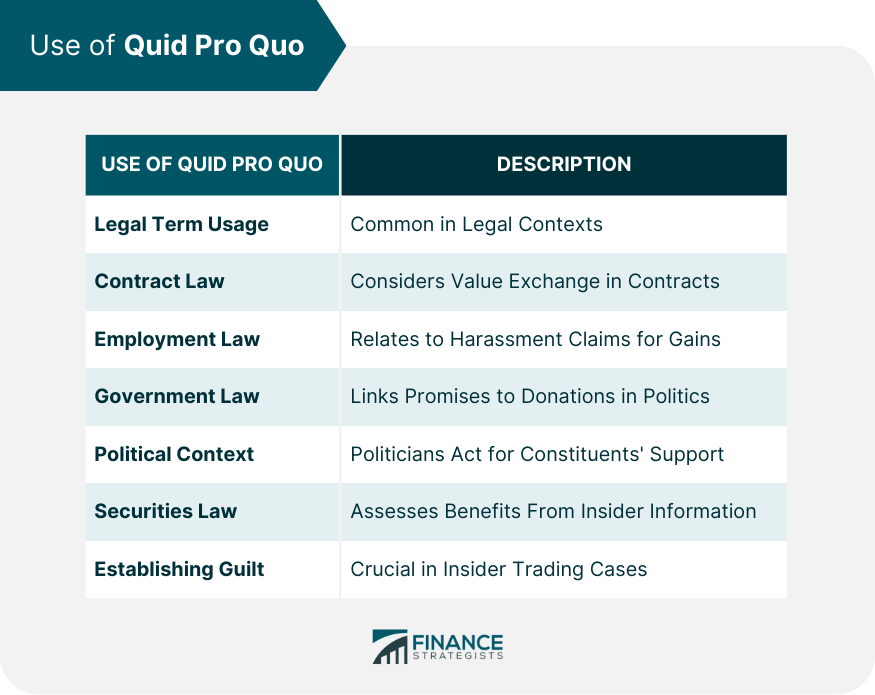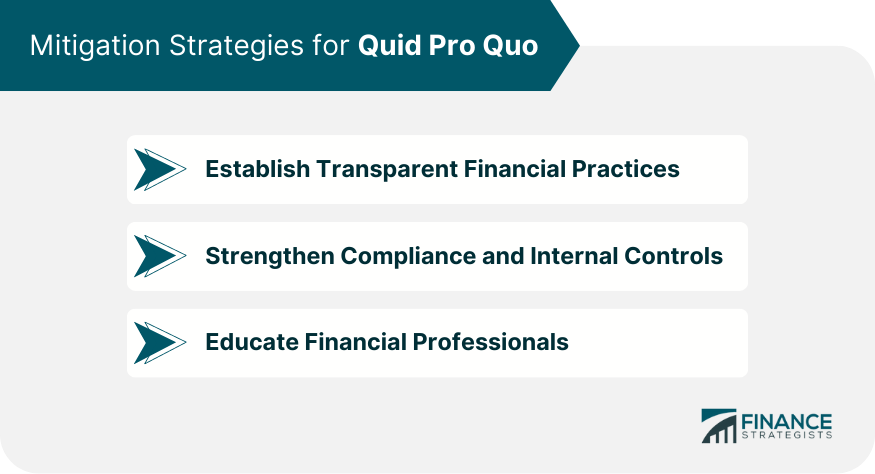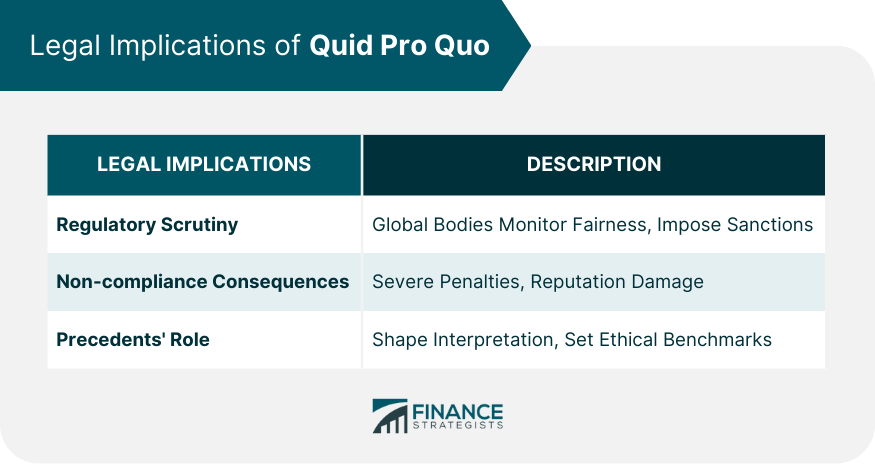Quid Pro Quo is a Latin term meaning "something for something" that implies a reciprocal relationship between two parties. It is used to differentiate between items that are given solely as gifts, with nothing expected in return and those items that are given in an exchange i.e., in "consideration" for something else. It is a mutual agreement where one thing is given in exchange for another. It refers to the understanding that a service or advantage will be provided in return for something of comparable value. This reciprocity principle ensures that both parties in a transaction receive a commensurate benefit. While the term might sound formal or even antiquated, it is a foundational concept in finance. Every monetary transaction, at its core, embodies the quid pro quo spirit: goods or services are exchanged for money, both sides expecting a fair value in return. The term was first used in the 16th century by apothecaries who substituted one potion or medicine, if they did not have it in stock, for another. It has broad applications within business and legal contexts in modern society and is generally used to refer to an exchange of goods or services that have approximately equal value. Bartering is an example of a business quid pro quo because both parties exchange goods or services that they mutually agree have equal value. When parties enter an agreement with a clear understanding of what they will give and receive, it streamlines the negotiation process and expedites deals. Without this mutual comprehension, parties might find themselves mired in prolonged negotiations, often resulting in wasted time and resources. Additionally, the principle minimizes disputes post-transaction. When both sides have a transparent understanding of what's expected, it reduces the likelihood of disagreements or misunderstandings down the line. Trust is the bedrock of all business relationships. When transactions are based on the quid pro quo principle, they naturally engender trust. Each party is assured that they will receive something of value in return for what they offer, fostering a sense of security and fairness. Over time, these transparent transactions cultivate long-standing relationships between businesses and partners. When parties consistently experience fair exchanges, they're more inclined to engage in future collaborations, laying the groundwork for sustained partnerships. By ensuring that each party receives commensurate value, it prevents exploitation or undue advantage. Both parties can enter and exit a transaction knowing that their interests have been safeguarded. This mutual benefit is pivotal, especially in global finance where disparities in knowledge, resources, or bargaining power can be pronounced. Quid pro quo levels the playing field, demanding fairness in every exchange. Quid pro quo is most frequently used as a legal term. In contract law, it is used to state whether consideration exists in a contract. In employment law, quid pro quo is used to refer to a type of sexual harassment claim where a boss or supervisor offers professional advancement opportunities, such as a promotion or pay raise, to their juniors in exchange for a sexual favor. In government law, the term describes a situation in which a politician may promise favorable legislation to a business, even though their constituents voted against it, in exchange for donations to the election campaign. In securities law, quid pro quo is used to evaluate cases of insider trading. It is important to establish a quid pro quo between both parties involved in the insider trading transaction in order to establish their guilt. Transparency is the first step in mitigating the negative aspects of quid pro quo, such as potential conflicts of interest or unethical behavior. By ensuring all financial practices and agreements are open and accessible, parties can monitor and verify the fairness of any transaction. This clarity not only deters unsavory practices but also reassures stakeholders that their interests are protected. Clear documentation of all transactions and agreements further fortifies this transparency. It ensures that all involved parties can revisit the terms and conditions, verifying that the spirit of quid pro quo is upheld. A robust system of internal controls is crucial to monitoring and maintaining the integrity of quid pro quo in financial transactions. By setting up regular audits, reviews, and checks, companies can ensure that all exchanges adhere to established standards and guidelines. Moreover, compliance departments play a pivotal role. They stay updated on evolving financial regulations and standards, ensuring that the company's practices align with both the letter and spirit of the law. By equipping financial professionals with knowledge about the intricacies of quid pro quo and its ethical implications, organizations can ensure that decisions are made with both financial and moral astuteness. Continuous professional development programs can update professionals on best practices, emerging trends, and potential pitfalls related to quid pro quo. This education arms them with the tools needed to navigate the complexities of financial exchanges. Regulatory bodies globally monitor financial transactions to ensure they adhere to the principles of fairness, transparency, and legality, with quid pro quo being a fundamental part of this scrutiny. These bodies have the authority to impose sanctions, fines, or other punitive measures on entities that violate the standards. The goal is not just punitive but also preventive. By setting clear guidelines and monitoring adherence, these bodies aim to maintain a financial landscape that's just and equitable for all participants. Non-compliance with quid pro quo standards, either through unfair exchanges or unethical dealings, can lead to severe liabilities. These might range from financial penalties to more grave consequences like business license revocations. Furthermore, non-compliance can result in reputational damage, which can be even more detrimental than financial losses. In today's interconnected world, news of unfair practices can spread quickly, leading to lost business and dwindling trust among stakeholders. Legal precedents play a significant role in shaping how quid pro quo is interpreted and enforced in financial contexts. Over the years, various court decisions have set benchmarks for what's deemed fair and ethical in financial exchanges. These decisions, while specific to individual cases, offer guidance to businesses and professionals about the boundaries and expectations related to quid pro quo. Staying aware of these precedents can aid organizations in making informed, legally sound decisions. Quid Pro Quo, stemming from the Latin "something for something," signifies a reciprocal relationship in financial transactions. This principle underpins fair and transparent exchanges, with each party receiving value equivalent to what they offer. It streamlines negotiations, builds trust, and prevents exploitation. Quid pro quo is a cornerstone of finance, embodying every transaction's essence, where goods or services are traded for money, ensuring both sides obtain equitable worth. Its origin dates back centuries, and its applications span contract, employment, government, and securities law. To mitigate its challenges, transparent practices, robust compliance measures, and ongoing education for financial professionals are crucial. Legal implications are enforced by regulatory bodies globally, mandating adherence to fairness and legality. Non-compliance entails severe liabilities, from fines to reputation damage. What Is Quid Pro Quo?
Quid Pro Quo Origin
Importance of Quid Pro Quo
Enhances Transaction Efficiency
Fosters Trust and Relationships
Ensures Fairness and Equitability

Use of Quid Pro Quo
The consideration refers to whether each party to an agreement is giving up something of value in exchange for a good or service of value from another party.
Often, politicians also ask for personal monetary benefits. To be clear, almost every political decision could be described as a quid pro quo situation in that the politician often acts on behalf of his constituents in exchange for their future vote.
Individuals or parties benefit, often monetarily, from exploiting information that is passed onto them in such cases.
Mitigation Strategies for Quid Pro Quo
Establish Transparent Financial Practices
Strengthen Compliance and Internal Controls
Educate Financial Professionals

Legal Implications of Quid Pro Quo
Enforcement and Regulatory Measures
Liabilities for Non-compliance
Precedents and Court Decisions

Conclusion
Quid Pro Quo FAQs
Quid Pro Quo is a Latin term meaning “something for something” that implies a reciprocal relationship between two parties.
The term was first used in the 16th century by apothecaries who substituted one potion or medicine, if they did not have it in stock, for another.
It has broad applications within business and legal contexts in modern society and is generally used to refer to an exchange of goods or services that have approximately equal value.
In contract law, it is used to state whether consideration exists in a contract. The consideration refers to whether each party to an agreement is giving up something of value in exchange for a good or service of value from another party.
Quid pro quo is used to evaluate cases of insider trading. Individuals or parties benefit, often monetarily, from exploiting information that is passed onto them in such cases. It is important to establish a quid pro quo between both parties involved in the insider trading transaction in order to establish their guilt.
True Tamplin is a published author, public speaker, CEO of UpDigital, and founder of Finance Strategists.
True is a Certified Educator in Personal Finance (CEPF®), author of The Handy Financial Ratios Guide, a member of the Society for Advancing Business Editing and Writing, contributes to his financial education site, Finance Strategists, and has spoken to various financial communities such as the CFA Institute, as well as university students like his Alma mater, Biola University, where he received a bachelor of science in business and data analytics.
To learn more about True, visit his personal website or view his author profiles on Amazon, Nasdaq and Forbes.











